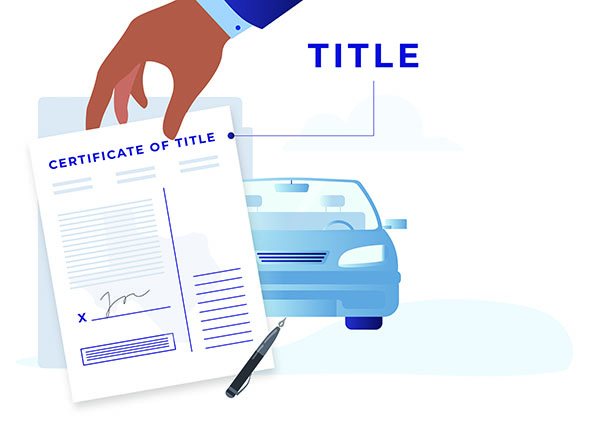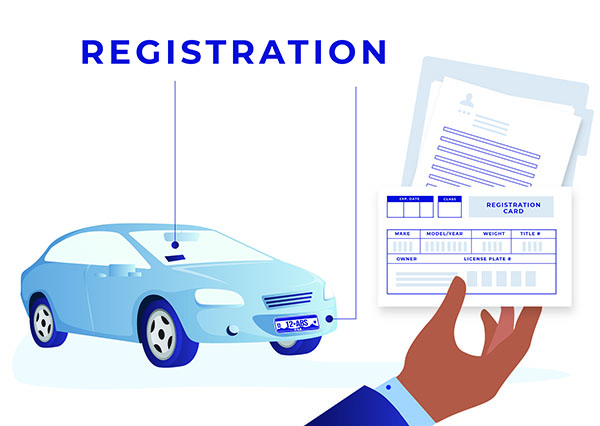In order for motor vehicles to be legally owned and driven, you’ll need to file for two important pieces of documentation: the title and registration.
Although vehicle titles and registration are often confused for one another, they’re actually very different. However, both are very important and necessary if you’re looking to refinance your vehicle. Let’s take a look at the difference between a car title, a vehicle registration, and what is the purpose of each.
Car Title vs. Registration
As mentioned, car titles and registration are not the same thing, and they serve two very different purposes. However, both are issued by local government agencies, and both are required in order for your vehicle to be legally owned, driven, and refinanced.
What is a car title?
One of the most complicated, critical, and lesser-known portions of the auto refinance process is titling.
Titles are legal documents declaring either a person or a lien holder as the legal owner of a vehicle. If you are purchasing your vehicle outright (without an auto loan), you are the new owner and, therefore, the title holder. However, if you finance your vehicle purchase, the bank actually owns your car until that debt is paid off, usually making the bank a lien holder.

In some states, the vehicle title will be issued to your lien holder until the lien is fully paid off. In other states, car titles are issued to the registered owner/operator regardless of the presence of a lien.
In order to process your vehicle’s title transfer, you will usually need to provide a few pieces of documentation including:
- A bill of sale
- Your current odometer reading
- Proof of insurance
- Proof of residency
You may also need to pay sales tax on your new vehicle at this time, along with any state title fees.
When purchasing a new car, dealerships will typically handle the titling process for you. When refinancing a car loan, you get a new loan with a new lender. This requires an adjustment to the vehicle title document to reflect that change. The lien holder changes from your original lender to your new refinance lender.
What is vehicle registration?
Registrations are essentially documentation by your state’s tax office validating that your vehicle has been cataloged in their system and determined as roadworthy. Every state has vehicle registration requirements of some kind, so you will need to complete this process before your car is legally allowed to be driven by someone with a valid driver’s license.
Though each state’s DMV (department of motor vehicles) has different requirements, most require all vehicle owners to complete the following in order to obtain a new registration:
- pay a tax or other registration fees
- pass a vehicle inspection, which may include an emissions test
- purchase minimum (or higher) car insurance
- have a licensed driver declare ownership of the vehicle (typically with a title or bill of sale)
Registered vehicles are issued a license plate and other documentation, such as a sticker, which may vary depending on the state.

Does registering my vehicle mean I own it?
Though car registration and titling usually go hand-in-hand, they don’t mean the same thing. Just because you have registered a vehicle doesn’t necessarily mean you own it — it just means that you have paid your state’s required taxes and fees and accepted responsibility for that vehicle’s operation on public roads.
A vehicle can be registered by a driver even if that car is technically owned (and titled) to another person, a dealership (as with a lease), or a lien holder (like an auto loan lender). However, most states will require you to show proof of ownership or a contract before allowing you to register the vehicle in that state.
Which Comes First: Car Title or Registration?
Generally, the vehicle’s title will need to be filed before registration can be completed. This really depends on your state, though.
Since a vehicle’s title demonstrates ownership, it is arguably the most important of the two. Whether you are buying a car in cash or purchasing (or refinancing) one with the help of an auto loan, ensuring that ownership has been transferred is imperative.
As we already touched on, many states will require you to show proof of ownership before you are able to register the vehicle as well. And if you have just recently purchased the car, you may be able to take care of both your title and your state’s registration at the same time.
Title, Registration, and Auto Loan Refinancing
Both the vehicle title and registration are required documents to refinance your car loan, but the title is the only document that must be updated. (If you refinance your car loan with RateGenius, we’ll work with your state’s DMV to handle the titling process for you.)
Registrations typically do not require updates unless they are about to expire, you move out-of-state, or you no longer wish to have another driver connected to the vehicle.
If you need to make any changes to your car’s registration — whether you’ve moved to a new state or want to remove another driver from the vehicle — you will need to do that separately. (If you don’t need to make any registration changes, though, then there’s nothing to worry about!)
With that said: At the time of titling, it is important that your registration is current, as registration issues can delay the title process.
Before Refinancing, Make Sure Your Registration is Good to Go
In order to complete any title process — whether you are buying, selling, or refinancing your car — the vehicle’s registration must be in good standing. The most common reasons why a registration would not be in good standing are:
- Toll violations
- Parking tickets
- Unpaid taxes
Any registration issues associated with your car can severely delay the title process. In turn, this can delay the final completion of your auto refinance loan.
About The Author
RateGenius
A better way to refinance your auto loan. RateGenius works with 150+ lenders nationwide to help you save money on your car payments. Since 1999, we've helped customers find the most competitive interest rate to refinance their loans on cars, trucks, and SUVs. www.rategenius.com
;)












